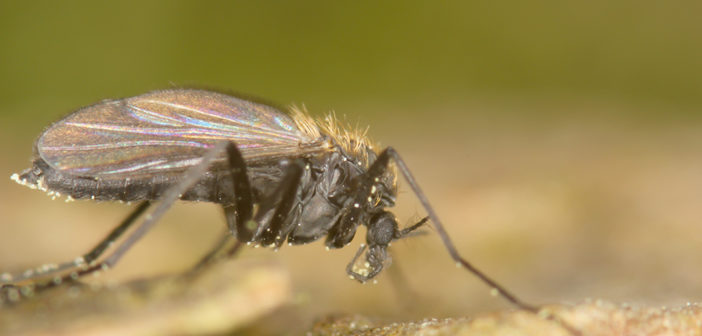In the past week there were four reports of gnat infestations in sorority houses on the Hill and a heavy presence of gnats near STEPS, Maginnes Hall and Sayre Field.
This was the first time Residential Services had to deal with an infestation of this magnitude, said Ozzie Breiner, the director of the office.
Members of several sororities called Residential Services to inform the office of the issue, Breiner said. However, students living in the Zeta Tau Alpha house had to take matters into their own hands when they noticed the gnats on the night of Sept. 8, said Sara Lampert, the house manger of Zeta Tau Alpha.
“(At) about 9 p.m. we started to notice (the gnats),” Lampert said. “Someone came up to my room and told me that there were bugs in the kitchen.”
Many of the sisters initially panicked at the sight of the gnats, she said. Throughout the night, the women became increasingly concerned as more gnats started to appear throughout the house.
The gnats hatched in the wooded area near the top of the Hill and then migrated in the direction of the sorority houses, as they are attracted to light, Breiner said.
The rooms in the ZTA house that were most affected by the infestation were those that had their windows facing the woods, Lampert said.
Residential Services offered tips to students to help them keep their rooms clear of bugs.
“Keep the lights off as much as possible because they’re drawn to light,” Breiner said.
Students were also advised to keep their doors shut and windows closed, as a window screen alone will not prevent gnats from entering a place of residency, he said.
“They can get in pretty much anywhere,” Breiner said. “Even if your screen is intact, they are so small that they can find tiny areas to get in.”
The ZTA sisters tried to use alternative methods to capture the gnats, Lampert said. They opened a jar of honey to see if the gnats would flock to it, which they did.
However, the idea only served as a short-term solution, Lampert said. The women then turned off the lights in the rooms without gnats, and kept the lights on in the rooms that were already infested, trapping the gnats. A majority of the gnats were dead by the following morning, and no known damage occurred as a result of the infestation.
Breiner said Lehigh hired Rid-et Pest Control of Nazareth to assess the severity of the infestation. The company ultimately deemed the gnats harmless.
The exterminators said the gnats die within 48 hours after spawning, Breiner said. Overall, there was not much the exterminators could do in this type of situation.
The exterminators did not use pesticides to kill the gnats, he said. The question of whether Lehigh should use pesticides to prevent further infestation still remains.
“Some pests are worse for us than the pesticides, so we commonly use (pesticides),” wrote Dork Sahagian, a professor of earth and environmental sciences, in an email.
Many individuals are concerned the use of pesticides can cause long-lasting damage on the environment, Sahagian said.
In the end it comes down to how Lehigh choose to address the problem of keeping gnats on campus or potentially disrupting the ecosystem and affecting the health of Lehigh students and faculty.






Comment policy
Comments posted to The Brown and White website are reviewed by a moderator before being approved. Incendiary speech or harassing language, including comments targeted at individuals, may be deemed unacceptable and not published. Spam and other soliciting will also be declined.
The Brown and White also reserves the right to not publish entirely anonymous comments.
1 Comment
Pingback: Alternative Earthcare & 3 Gnat Species To Be Aware Of | Expert Best Reviews